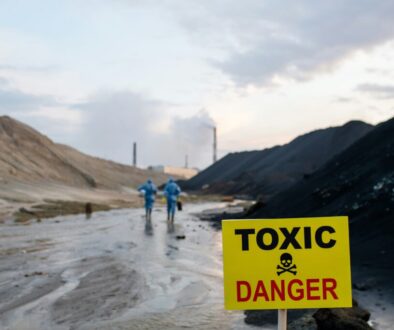Opinion: Revealing the toxic lobbying power of Bayer

By Hans van Scharen
Big fossil-fuel companies like Shell, Exxon, BP or Total are not your trusted source to go to for solid advice on how to urgently prevent the climate from changing ever faster. But for halting the spread of cancer and all kinds of degenerative diseases, helping farmers out of their collective socioeconomic nightmares, combating hunger or how to avoid a further collapse of biodiversity, policymakers find it completely normal to engage with powerful agrochemical companies like Bayer and BASF.
Yet these companies produce many chemical products that are bad for our health, for the environment and increasingly for democracy itself, as shown by Corporate Europe Observatory’s new report Bayer’s Toxic Trails.
Whether it’s over glyphosate, GMOs, or global warming, we show how the company attempts to capture public policy to pursue its private interests.
Bayer tries to legitimize this expensive lobby by being more or less transparent about it and calling it “political advocacy“. In fact, it is thanks to its deep pockets and economic clout capable of changing laws and regulations which should serve the general interest. Bayer simply wants to maintain monopolistic control of the seed and pesticides markets, fights off regulatory challenges to its toxic products, tries to limit legal liability, and exercises political influence.
First, there is the element of global market power and ever increasing concentration, making them an essential part of a small club of global Food Barons. Just four of these multinationals – Bayer, BASF, Corteva and Syngenta – control over 65% of global trade in pesticides and at least half of the world’s seed trade. That represents a multi billion euro market, co-control over the world’s production of food, and deep political influence on agricultural and environmental policies.
Just for the record: the successful lobby campaign to take down the Farm to Fork strategy, a crucial part of the EU Green Deal, was the work of these companies, their consultancies and trade associations like Croplife (with a little help from their political friends, of course).
Bayer and allies were also spearheading the campaign to prolong the EU authorization for glyphosate with another 10 years, despite a wealth of scientific indications that show the product is a disaster for health, biodiversity, soil and water.
Several independent scientific studies show that glyphosate can be carcinogenic. As Pesticide Action Network (PAN) wrote “to re-approve glyphosate is a violation of the EU Pesticide Law that says that health and environment should go first”. Several NGOs are taking the European Commission to court on the glyphosate decision.
Bayer and it’s powerful friends like talking about ‘innovation’ and ‘science-based policies’, provided that they can determine what’s correct science and what’s not.
In an open letter of April this year Bayer calls all the independent findings from scientists on glyphosate, including those from the International Agency for Research on Cancer (IARC), ‘junk science’. It’s a reminder of the active and expensive campaign by Monsanto to manufacture ‘outrage’ at IARC over its cancer classification.
Its lobby tactics include manipulating science, funding disinformation campaigns, influencing regulators, using trade policy as a way to bully third countries to change their laws, and delaying and distracting policy makers with investment promises. Bayer, which bought US-based Monsanto in 2018, has lobbied hard (sometimes with success) to change or influence laws, regulations and policies, not only in the EU but also in Thailand, Mexico, Africa and now also in the US.
The intensive lobby-campaign Bayer has staged in the US is outrageous from a democratic perspective. Bayer is actively lobbying to change US law. According to media reports, it co-wrote some amendments, both on a federal and state level, to avoid further RoundUp-litigation brought by cancer patients.
Because the labels of products that contain glyphosate have not warned users of its potential dangers sufficiently, Bayer/Monsanto faces no less than 170,000 lawsuits so far, of which 60,000 are still pending. The company has agreed to pay more than $11 billion in settlements and been ordered to pay additional large sums by juries.
A new global media investigation just revealed that “US taxpayers funded a covert campaign to downplay the risks of pesticides and discredit environmentalists in Africa, Europe, and North America”. The New Lede and other outlets revealed how a Missouri company founded by a former Monsanto executive helped tried to counter pesticide critics and others, including environmental scientists or sustainability campaigners.
All these kind of legal battles and lobby operations cost a lot of money, which its shareholders do not appreciate.
In the past two years Bayer has risen to one of the top lobby spenders in the EU and worldwide.
According to the EU lobby register, Bayer AG spent up between €7m to €8m in 2023 on EU lobbying.
For the year 2022, the company self-declared spending €6.5m on lobbying in the EU, €2.5m in Germany and €4m on fees for EU based trade and lobby associations like Croplife Europe. This makes an estimated total EU lobby budget of well above €10m.
For the year 2022, Bayer declared spending €49m worldwide on lobbying, as well as an extra €26m on trade association fees, which adds up to a staggering €75m (though the company does not clearly indicate the fees as lobby costs, which is required by the EU Transparency Register).
Bayer makes products that are bad for our health and ecosystems and by aggressively defending its commercial interests, it is also harming democracy. It must not be allowed to continue its destructive business, in the EU or elsewhere. It’s time for toxic-free politics.
Hans van Sharen is a researcher and campaigner at Corporate Europe Observatory specializing in agribusiness & food, pesticides, GMOs, and lobbying the European Union.
(Opinion columns published in The New Lede represent the views of the individual(s) authoring the columns and not necessarily the perspectives of TNL editors.)
(Featured image by Getty Images for Unsplash+.)



